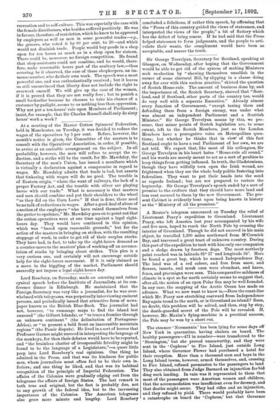Lord Rosebery, on Saturday, made an amusing and rather cynical
speech before the Institute of Journalists, at its con- ference dinner in Edinburgh. He maintained that the Foreign Secretary was very like a journalist, for he was over- whelmed with telegrams, was perpetually interviewing eminent persons, and periodically issued that attractive form of news- paper known as the British Blue-Book. The journalist had not, however, "to rummage maps to find the island last annexed" (the Gilbert Islands), or "to trace a frontier through an unknown continent" (the delimitation of Portuguese- Africa), or "to present a bold front on inaccessible mountain regions" (the Pamir dispute). He lived in a sort of horror that Professor Garner might succeed in interpreting the language of the monkeys, for then their debates would have to be reported, and "the brainless chatter of irresponsible frivolity might be found to be the language of a Legislatare,"—a queer little peep into Lord Rosebery's real opinions. One thing he admired in the Press, and that was its kindness for public men, whom journalists must often feel to be their own in. feriors ; and one thing he liked, and that was its habitual recognition of the principle of Imperial Federation. The affairs of the Colonies were gradually edging out from the telegrams the affairs of foreign States. The last remark is both true and original, but the fact is probably due, not to any growth of the federal idea, but to the increasing importance of the Colonies. The American telegrams also grow more minute and lengthy. Lord Rosebery concluded a felicitous, if rather thin speech, by affirming that the "Press of this country guided the views of statesmen, and interpreted the views of the people," a bit of flattery which has the defect of being coarse. If he had said that the Press helped statesmen to form judgments, and the people to arti- culate their wants, the compliment would have been as acceptable, and nearer the truth.


































 Previous page
Previous page